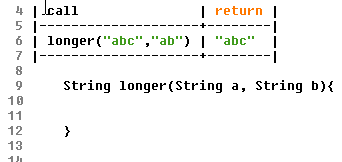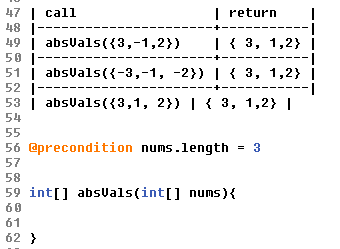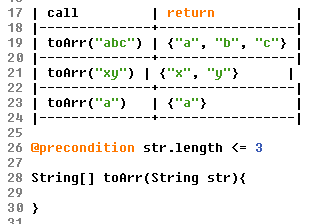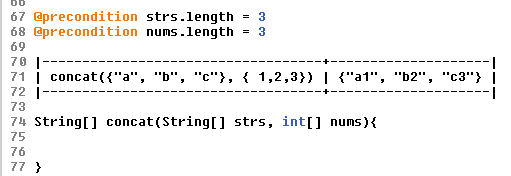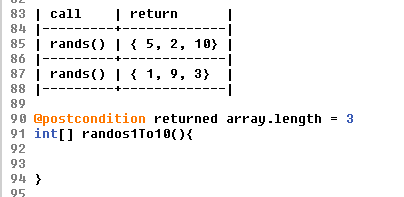public int countF(String str)
Description: This method returns the number of times that the letter ‘f’ occurs in str.
| Method Call |
return value/output |
| countF(“abcdef”) |
1 |
| countF(“abcdfef”) |
2 |
| countF(“fff”) |
3 |
| countF(“xxx”) |
0 |
public boolean has2Fs(String str)
Description: This method returns true if str has exactly two occurrences of the letter ‘f’ in it.
| Method Call |
return value/output |
| has2Fs(“foo”) |
false |
| has2Fs(“fofo”) |
true |
| has2Fs(“foffo”) |
false |
public boolean has2Fs3Gs(String str)
Description: This method returns true if str has exactly two occurrences of the letter ‘f’ in it and 3 occurences ‘g’.
| Method Call |
return value/output |
| has2Fs3Gs(“foog”) |
false |
| has2Fs3Gs(“foggfog”) |
true |
| has2Fs3Gs(“foffoggg”) |
false |
public int momOrDad(String str)
Description: This method returns the number of times that the String “mom” or the string “dad” occurs in the parameter str .
| Method Call |
return value/output |
| momOrDad(“foog”) |
0 |
| momOrDad(“momf”) |
1 |
| momOrDad(“momdadmo”) |
2 |
| momOrDad(“momdadmom”) |
3 |
public String threeTimes(String str)
Description: This method returns the String str concatenated with itself three times
| Method Call |
return value/output |
| threeTimes(“foog”) |
“foogfoogfoog” |
| threeTimes(“abc”) |
“abcabcabc” |
| threeTimes(“zt”) |
“ztztzt” |
| threeTimes(“”) |
“” |
public String nTimes(String str, int n)
Description: This method returns the String str concatenated with itself n times
| Method Call |
return value/output |
| nTimes(“fg” , 2 ) |
“fgfg” |
| nTimes(“abc” , 0 ) |
“” |
| nTimes(“zt” , 3 ) |
“ztztzt” |
| nTimes(“uiz” , 4 ) |
“uizuizuizuiz” |
public String countMiddleChar(String str)
Precondition: str.length() ≥ 3.
Description: This method returns the number of times the middle letter of str appears in str.
| Method Call |
return value/output |
| countMiddleChar(“acbcb” ) |
2 |
| countMiddleChar(“acbcx” ) |
1 |
| countMiddleChar(“bbbbb” ) |
5 |
| countMiddleChar(“xytbtzy”) |
1 |
public int indexOf(String haystack, String needle)
Description: Write your own indexOf() method. Obviously, you cannot make use of the String’s build in indexOf() method. This method returns the index of the first occurrence of needle in haystack . (Full credit if you can get this to work with Strings whose length is greater than 1).
| Method Call |
return value/output |
| indexOf(“acxb”, “x” ) |
2 |
| indexOf(“zazt”, “z” ) |
0 |
| indexOf(“tayv”, “g” ) |
-1 |
| indexOf(“hijklj”, “j” ) |
2 |
If you want the extra credit, then it must also be able to complete the following example calls
| Method Call |
return value/output |
| indexOf(“acxb”, “cx” ) |
1 |
| indexOf(“acxb”, “cxb” ) |
1 |
| indexOf(“acxb”, “cxbt” ) |
-1 |
public int countChars(String str, String chars)
Precondition:The length of chars is less than or equal to the length of str
Description: This method returns the number of times that charsoccurs in String str.
| Method Call |
return value/output |
| countChars(“momdadmom” , “dad” ) |
1 |
| countChars(“foobofoo” , “foo”) |
2 |
| countChars(“foobofoofoo” , “foo”) |
3 |
| countChars(“foobofoofoo” , “xy” ) |
0 |
